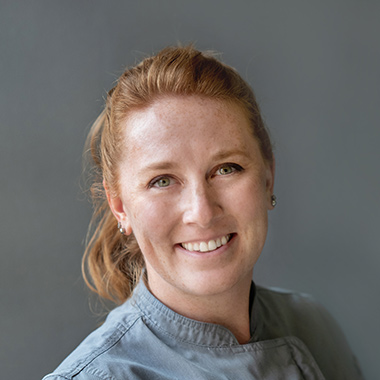

Andrea Todd ’21
Alumni Spotlight: Master’s in Food Business
CIA Alumnus Andrea Todd Is Shaping the Future of Desserts
As vice president of foodservice culinary customer development at Dessert Holdings, Andrea Todd works closely with national restaurant brands on their dessert offerings. Drawing on her experience as a pastry chef, she helps design menus that aren’t too hard on the back-of-house, while keeping one eye on the latest trends and another on the future of dessert innovation. (A free sample: expects more unique visual dessert experiences, she says, featuring naturally colorful ingredients like ube and dragonfruit.)
Andrea is also an alumnus of the Culinary Institute of America’s prestigious master’s in Food Business program, which she graduated in 2021. Combining online courses with immersive in-person residencies in Napa Valley and the Hudson Valley, CIA offers peerless academic opportunities to chefs, culinary professionals, and others transitioning into the food industry. For Andrea, it was also a chance to explore her artistic side.
A Business Education for Creative People
Andrea considered a number of MBA programs before settling on CIA’s. Her decision was influenced by her desire to seek more than just a business education, but also a creative one. “My undergrad was in business and art, so I’ve always had two practices under me, and I wanted to make sure that continued,” she reflects. “I also knew that I wanted to stay in a culinary-forward role, and that CIA would be the best place.”
She wasn’t disappointed. As a student in the Food Business program, Andrea sharpened her creative acumen in concert with her professional skills, especially in her design and marketing classes. Equally valuable was the opportunity to study with CIA’s expert faculty. “I really loved that we had instructors who were in the industries of our focus,” she says, singling out Professors Brooke Golden (Differentiation, Branding, and Packaging) and Jen Paragello (Concept Building, Proving, and Prototyping). “Case studies were able to be discussed as real examples they had been through during their careers. I thought that was super valuable.”
Looking back, she says that the lessons she learned about marketing and design thinking continue to influence her day-to-day work at Dessert Holdings. So does her coursework in Dr. Robert Johnson’s ethics course, which has proven resonant in a world increasingly concerned with ESG. “That comes up a lot,” she says.
By working closely with other professionals in her cohort, Andrea gained a deep appreciation for the collaborative spirit that’s essential to running successful food businesses. “One of the biggest things I got out of it was that you don’t need to be the expert at everything—but you should have a really good group of resources to make sure that you’re making the right business decisions,” she says. “You should know enough to call out things that look incorrect, and then have a good group of folks that are there to support you and dig in where it’s their specialty more than yours.”
Building a Foundation for the Future
As Food Business students approach the end of their studies, they transform theory into practice in the form of a capstone project. Leveraging their mastery of everything from branding strategies to supply chains, they develop a detailed business plan for a food product or restaurant venture. Some students even go on to launch this business after graduating the program.
Andrea describes her own capstone project as a business delivering “robotic food solutions” to consumers on the go. Combining the latest advances in robotic kitchen technology with high-quality ingredients, the business would serve delicious prepared meals to customers in settings like airports, where they could order via app while heading to their gate. People told her she was “out of her mind” when she was working on it—there wasn’t exactly much air travel going on in 2020 and 2021—but she was inspired by her own experiences as a business traveler, as well as the industry’s rising interest in robotics.
“It was all about how to have good food on the go,” she says. “The catch line was scan, grab and go. Your food’s waiting for you. You just take it out of this hot box portal and then go get on your airplane, but it’s made with real ingredients.”
Did she end up launching her plan? “Ask me in five years,” she says. “Maybe I’ll get there.”
A Degree that Makes a Difference
While she may not have turned her capstone project into reality (yet), Andrea says her studies undoubtedly helped advance her career. “I definitely have been taken more seriously at work,” she observes. “I’ve had maybe two promotions since graduation, so now I’m on our foodservice leadership team. I definitely do believe that the master’s program was integral to continuing to move up.”
Reflecting on broader tectonic shifts in the food industry, she returns to the importance of conversations around ESG. “What are we doing to better our food systems? How are we giving back?” she asks. “We work really closely with a chocolate supplier who’s doing things to empower their workers based in Africa and things like that. I think that topic is going to continue to be top-of-mind.”
For professionals considering enrolling in CIA’s Food Business master’s program, Andrea offers two words of advice: “Do it.”
“It was great—I made a ton of friends, a ton of connections,” she says. “I would say the only downside of our time was that we were in the middle of COVID-19. We were the second group, so we did not get to do as many immersions, but we still were able to bond as a cohort. Two years post-graduation, we’re all still in contact, keeping in touch, supporting each other where we can.”



